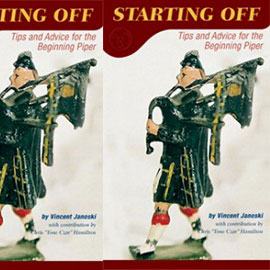7 Steps to Psyche-Up Your Bagpiping
“The one who goes farthest is generally the one who is willing to do and dare.â€â€”Dale Carnegie
How much risk and uncertainty do you allow in your own life? We all have our own way of handling risk, and any artistic or creative pursuit involves risk. We never really know what kind of results our hard work will bring or even the best way to achieve them. The emotional investment in one’s chosen art brings with it a certain amount of uncertainty and vulnerability. Competition of any kind is a creative pursuit that involves psychological risk taking. And anyone who belittles the activity of bagpipe competition has likely never been involved in anything more psychologically arduous than buying a toaster oven. They have no idea how personally grueling it can be.
As competing bagpipers we lay out our egos to a knowledgeable community of peers—perhaps the harshest audience of all—sometimes on a weekly basis during active parts of the competitive calendar. The overall effect can be elation, confusion, anxiety, abject terror, or simply butterflies. Either way, many pipers and drummers can be hampered by the psychological baggage that accompanies the risk of performance or competition.
So, how do you handle uncertainty and risk? The answer can be as defining an aspect in your playing as the quality of your expression in a strathspey. It is a truism to say that a great amount of risk can also bring the greatest rewards. Developing the mental skills for creative risk taking can allow you to channel uncertainty and derive the greatest joy from your piping pursuits. If you want something to practice that will work toward the rewards of a personal best, general competitive success, or just plain personal satisfaction, work on the tactics in the following list to psyche-up your bagpiping for your own good.
- Be prepared to make mistakes and learn to ignore social disapproval. Mistakes on the bagpipe happen and a “flawless†performance for any level of player is a rare thing. Prepare yourself to make mistakes, make them often, and get over them. It is almost anathema to bagpipe competition since it is all about what “others†think when your are being evaluated by a judge, but, stop worrying about what others think.
- Tolerate the anxiety of uncertainty to find the best results. The first solution is not always the best. The best way to get the results you want in your piping or drumming comes from exploration. Only a fool is convinced of a “sure thing.†Practice being adventurous.
- Develop an accurate perception of reality rather than twist it to suite your own ends. Face your mistakes and frustrations head on. Admit your mistakes. Be honest with yourself. The “blame game†in bagpipe competition is popular one: “That judge just doesn’t like me;†“I heard so-and-so play and there is no way I placed behind him;†“If only the judging were better.†Stop playing that game. If things have, or haven’t gone your way, there is probably a valid reason amidst the clamor of your own narcisism. Find that reason and use it to build on your further development.
- Stop wasting time on “growth” and “development.” Get out there. Meet new people and find new experiences. Incessant bagpipe rehearsal or tuition will only get you so far. Stop waiting for your playing to reach a certain quality before you reveal it to the world. Get your kilted arse out there and perform.
- Take nothing for granted. Never settle. Your bagpipe can always be better. A tune can always be played with more feeling, your playing can always be more musical and exciting. Find the way.
- Enjoy the contradictions in life. Even though things don’t go your way, even after you’ve done all the right things, it’s okay. Playing bagpipes can be infuriating, but that is part of its charm.
- Be yourself. Opinions abound in bagpiping. Everyone you meet will have their own personal “vision†on piping and drumming and pipe bands. Teachers and other bagpipers and drummers are certainly good guides to navigate the pesky art of bagpiping. But in the end, you should feel free to develop your own ideas and opinions, develop your own approach to the music, and create your own musical statement.
 Pipehacker
Pipehacker








